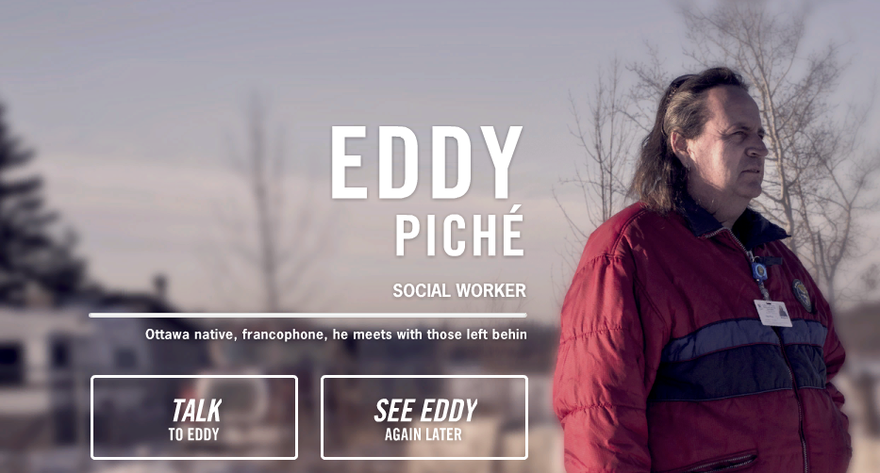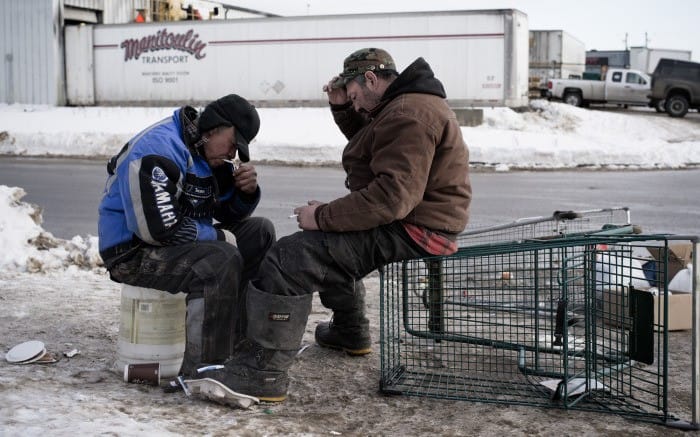You cannot win Fort McMoney, but you should still play it

Fort McMoney is an interactive web documentary in which you are given the chance to explore the town of Fort McMurray in Alberta, Canada. Why would you want to do that? McMurray was first settled in 1870, became a town in 1948 and a city in 1980, and while the nearest major city is Edmonton and that’s not that close, Fort McMurray isn’t just any old town in the middle of nowhere. There’s a reason for the nickname McMoney: the city happens to be located next to the highest concentration of oil sands reserves in Canada.
Here’s why that’s a big deal: oil sands consist of sand and sandstone from which bitumen can be extracted, and bitumen is a dense and extremely viscous form of petroleum that some people call tar and others call “black gold.” It’s only recently that the technology and the price of oil has made the large-scale extraction of bitumen from the oil sands feasible and it’s estimated that over 70 percent of bitumen reserves are found in Canada. This means that this McMurray has, in recent years, gone from a frontier town in the middle of a snowswept wilderness into a boom town. This is a modern day Deadwood.
As you explore Fort McMoney, which takes its name from a popular nickname for the town, you meet the cast of characters that populate it. You get to interview people across the political and social spectrum: from academics and lobbyists to the homeless and destitute. Drawing on what you discover about the town and its relationship with the petroleum industry, you engage in debates with other players and vote on key issues at the end of each week. What’s best for the town? What’s best for Alberta, for Canada, for the world? Depending on what you decide as a playing community, you see an extrapolation of the town’s possible future: what would happen if these decisions were made in reality? McMoney deviates from McMurray as the game makes a fiction out of a possible future. The first season of the game is over but the second season is launched on January 27th, with ever-increasing possibilities for the alternate-universe city.

The mixture of documentary and interactivity didn’t come out of the blue. Fort McMoney’s creator, David Dufresne, had already made Prison Valley in 2010, though he makes a clear distinction between the two. “Prison Valley borrowed certain elements of its grammar from videogames,” he told me, while “Fort McMoney appropriates them.” He is keen to emphasise this. “Prison Valley was a web documentary with playful allusions; Fort McMoney is a true documentary game .”
The interface of this true documentary game, then, is mostly point and click: you see a character and you click on them in order to talk to them, which then takes you to a filmed section in which you can choose among questions to ask. There’s also a dashboard where you can see the “missions” you need to complete (areas you need to explore, people you need to talk to, and so on). This seems very RPG-lite, but Dufresne emphasises the top-down element rather than the on-the-ground aspects, citing SimCity as the main influence. “My idea was to propose a kind of real-world SimCity but with one essential change that makes all the difference: everything is factual, and based on a real town.” The team were particularly excited when they were name checked by Will Wright in the New York Times.
As a humanitarian viewing a documentary, these social problems all break my heart.
If you started a game of SimCity with a large proportion of the world’s bitumen resources, you’d be at a pretty massive advantage in terms of attracting Sims, and it’s specifically this influx of workers, many of them temporary, that is at the heart of the problem with Fort McMurray. All kinds of social problems spin off from that, including inflated property prices, alcohol and drug abuse, and prostitution. As a humanitarian viewing a documentary, these social problems all break my heart. As a SimCity player enjoying a game, I’m enthralled by the promise of all this capital.
It’s a strange tension but one Fort McMoney doesn’t ever really ask me to engage with; all I’m amassing as I go through the town is “influence.” Without the possibility of being “good” at it or winning, I reverted to my position as the documentary viewer who thinks these massive exploitative oil companies are awful and the town would be better off without them. Dufresne says that they tried to make the mechanics of the game as objective as possible, but also acknowledges that the game reflects an “auteur’s perspective through choices including framing of shots, editing, the people we feature and the locations.”
When I engaged with the online debates and voting, I noticed that the issues being tabled (which are, of course, also authored) tended to fall along quite clear political lines: on one hand, there would be the pro-oil industry, broadly right-wing option; on the other, there would be the more environmentally and socially conscious, broadly left-wing option. When it came to a vote, despite cogent arguments made on both sides, the results fell at more or less 75 percent on the left and 25 percent on the right. This made me wonder if the game was attracting the broadest spectrum of political beliefs, encouraging debate or merely preaching to the choir. Dufresne admits that “it seems that those who are more pro-industry had more trouble getting into our game,” but adds, “Those who did defended their point of view with solid arguments .” For season two, one of the team’s goals is to attract more pro-industry players.

Who are these players though? I was acutely aware, as I played, of my distance from the real life Fort McMurray. These decisions weren’t going to have a significant impact on me. That distance might have allowed me to be more idealistic or more callous, depending on the context of what was being presented. Of the 191,613 different players populating the online town, the majority were, like me, playing it from the other side of the Atlantic (38 percent from France and 27 percent from Germany). Twenty percent were from Canada and only 3 percent came from the United States. Dufresne tells me that they had site visits from nearly 2,000 residents of the real-life Fort McMurray and that some wrote personally offering their support. That’s noteworthy given that the city has a permanent population of around 60,000. I really want to know how they voted.
What’s strange about Fort McMoney as a game is that you amass points in the form of influence, but all that really matters for the outcome is what the online community decides. The documentary elements of the game are just a way in to the public debate. The FPS player inside of me balks; he wants to know if there’s any way that I personally can win Fort McMoney by becoming the King of the Oil Sands or whatever. Dufresne says, “Fort McMoney is a kind of direct democracy platform in web time. If there is a winner it will be the clash of ideas.” If Fort McMoney succeeds, too, it will be on these terms: as a fractious mess of perspectives. While Fort McMoney may not have all the answers, perhaps the questions it asks are good enough.



